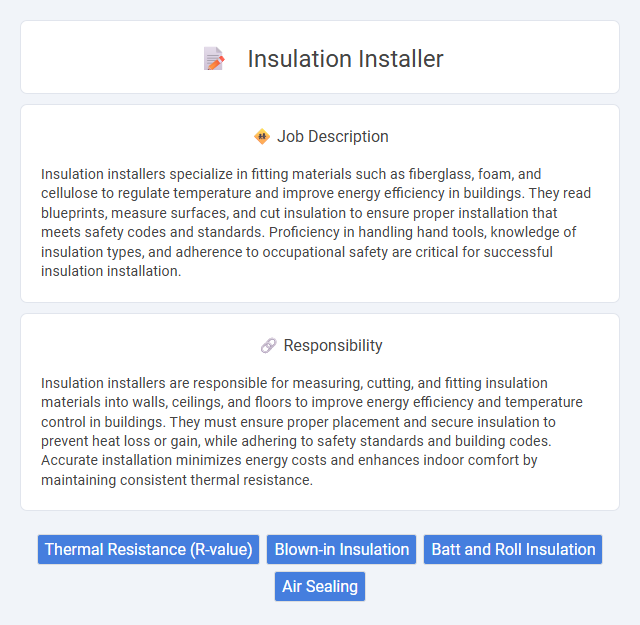
Insulation installers specialize in fitting materials such as fiberglass, foam, and cellulose to regulate temperature and improve energy efficiency in buildings. They read blueprints, measure surfaces, and cut insulation to ensure proper installation that meets safety codes and standards. Proficiency in handling hand tools, knowledge of insulation types, and adherence to occupational safety are critical for successful insulation installation.
Individuals with good physical stamina and the ability to work in confined or awkward spaces are likely suitable for an insulation installer job. Those who may have respiratory conditions or allergies could face challenges due to exposure to dust and insulation materials. People comfortable with manual labor and teamwork tend to adapt well to the demands of this occupation.
Qualification
Insulation installers typically require a high school diploma or equivalent along with specialized training in thermal insulation materials and techniques. Certification programs such as those offered by the National Insulation Association enhance job prospects and demonstrate expertise in safety standards and proper installation methods. Physical fitness and the ability to read blueprints or technical instructions are essential qualifications for efficiently installing insulation in residential, commercial, or industrial settings.
Responsibility
Insulation installers are responsible for measuring, cutting, and fitting insulation materials into walls, ceilings, and floors to improve energy efficiency and temperature control in buildings. They must ensure proper placement and secure insulation to prevent heat loss or gain, while adhering to safety standards and building codes. Accurate installation minimizes energy costs and enhances indoor comfort by maintaining consistent thermal resistance.
Benefit
Insulation installers likely enjoy benefits such as competitive wages and steady demand in construction and renovation projects, which may offer job stability. Health insurance, retirement plans, and paid time off are commonly provided, contributing to overall employee well-being. Opportunities for skill development and potential overtime pay might also enhance the financial and professional advantages of this career.
Challenge
Insulation installers likely face the challenge of working in confined spaces and extreme temperatures, which can impact comfort and safety. The probability of encountering irregular surfaces or structures may require precise measurements and adjustments, demanding strong problem-solving skills. Managing the physical demands of lifting and positioning heavy materials could increase the risk of fatigue or injury.
Career Advancement
Insulation installer jobs offer significant opportunities for career advancement through specialized training and certification in areas such as spray foam and thermal systems. Gaining expertise in energy efficiency and building codes can lead to supervisory roles, project management positions, or technical consulting careers. Advancement often requires hands-on experience, continued education, and proficiency in using modern insulation materials and installation techniques.
Key Terms
Thermal Resistance (R-value)
Insulation installers specialize in applying materials with high thermal resistance to improve a building's energy efficiency by enhancing its R-value, which measures the material's ability to resist heat flow. Proper installation ensures optimal thermal performance, reducing heat loss in winter and heat gain in summer, thereby lowering energy costs and improving indoor comfort. Skilled installers select and fit insulation types such as fiberglass, spray foam, or cellulose precisely to achieve the targeted R-value specified by building codes and energy standards.
Blown-in Insulation
Blown-in insulation installers specialize in applying loose-fill materials such as cellulose, fiberglass, or mineral wool into attics, walls, and other cavities to enhance thermal efficiency and soundproofing. Using specialized blowing machines, they ensure even distribution and proper density, which prevents gaps and improves energy conservation. Proficiency in safety protocols and knowledge of material properties are critical for optimal installation and long-term building performance.
Batt and Roll Insulation
Insulation installers specializing in batt and roll insulation expertly measure, cut, and fit fiberglass or mineral wool materials to improve thermal efficiency and soundproofing in residential and commercial buildings. These professionals ensure proper installation between wall studs, floor joists, and ceilings, reducing energy loss and enhancing building comfort. Mastery in handling different insulation densities and vapor retarders is essential to optimize performance and meet industry safety standards.
Air Sealing
Air sealing is a crucial skill for insulation installers, significantly enhancing energy efficiency by preventing drafts and heat loss in buildings. Proper air sealing techniques improve indoor air quality and reduce utility costs by creating a tight building envelope. Mastery of materials such as spray foam, caulk, and weatherstripping is essential for effective air sealing performance in residential and commercial insulation projects.
 kuljobs.com
kuljobs.com